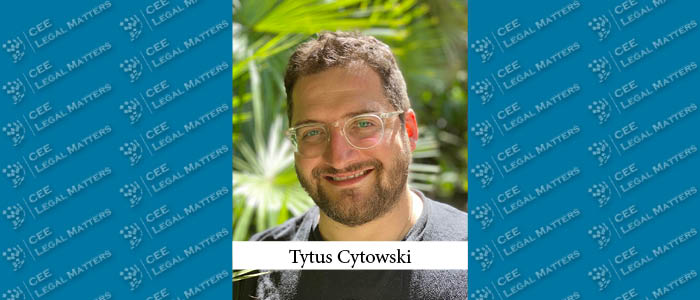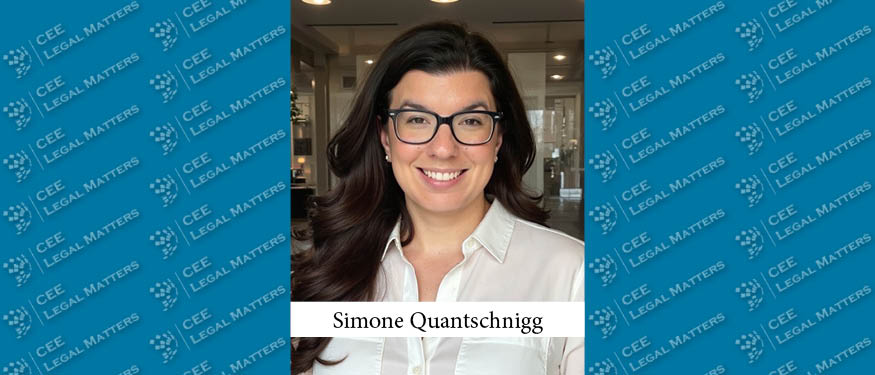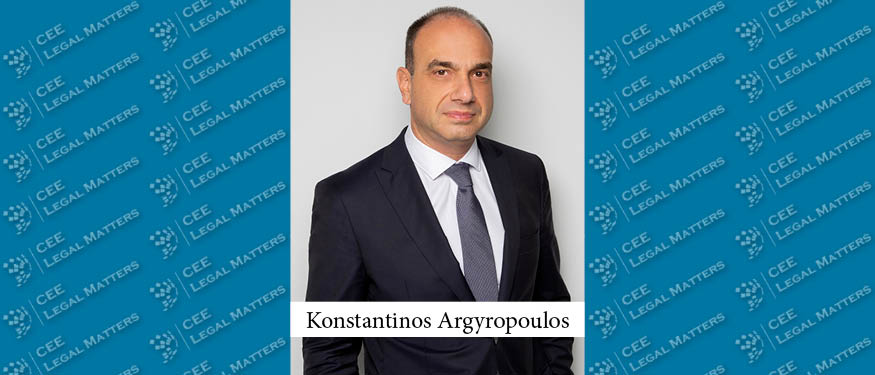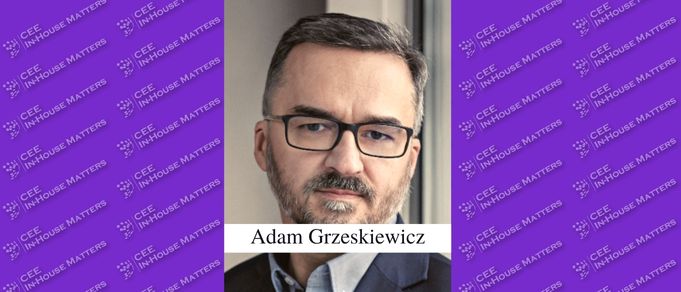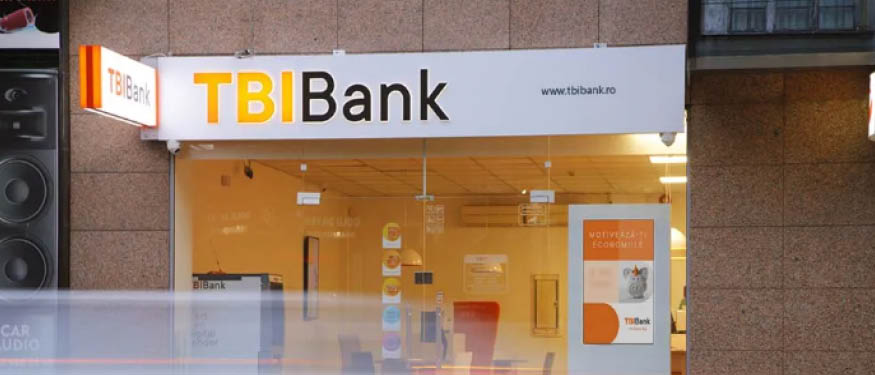In our Looking In series, we talk to Partners from outside CEE who are keeping an eye on the region (and often pop up in our deal ticker) to learn how they perceive CEE markets and their evolution. For this issue, we sat down with Cytowski & Partners Managing Partner Tytus Cytowski.
CEELM: What were your initial experiences with the CEE region?
Cytowski: With my Polish roots and my professional base in the US, I’ve been involved in a legal practice that has a strong focus on the CEE region.
As a lawyer, my first notable interaction with the region was around 2012, when I facilitated an M&A acquisition of a Polish software company called Apphance by a US buyer. Following this, I had my first Polish startup client, who successfully entered the Y Combinator accelerator in Silicon Valley. This led to a series of other clients, and based on those interactions, I built products around US market expansion support for technology companies and venture financing.
I initially focused on Poland, leading to the establishment (and subsequent closure) of a branch office there. In time, we shifted our focus to Bulgaria, Romania, and the Czech Republic, recognizing their potential as future unicorn production hubs. The launch of UiPath in 2015 and product board in 2016, where I represented Prague-based Credo Ventures with seed financing solidified my involvement in the Silicon Valley/CEE tech ecosystem. At that time, I also got involved as a counsel for Bulgarian-based Gtmhub in their expansion to the US and started to work closely with Launchub and Earlybird seeding startups in the Balkans. Essentially, this gave me early insights into the appetite and dreams of people in CEE, as well as the caliber of technical founders.
CEELM: What about your recent activities? What has kept you busy in the last 12 months?
Cytowski: Over the past year, our firm has predominantly focused on venture financing and helping CEE clients expand to the US, particularly California. We’ve experienced a 20% growth compared to the previous year and have been involved in over 60 VC financings. Additionally, there has been a surge in M&A activity, mainly originating from the Czech Republic in the fourth quarter. Many VC-backed companies are increasingly seeking M&A opportunities, which I hopd to continue, especially as VC funds with 10-year lifespans are reaching their exit periods. The year 2023 had its ups and downs, but I expect a significant increase in venture activity moving forward.
CEELM: Where do you foresee the most activity in the coming 12 months?
Cytowski: I firmly believe that we are currently witnessing the golden years of the CEE region, particularly in the tech sector. We’re likely to see a surge in product-based companies as opposed to solely software-based ones.
Specifically, Poland has the potential to witness more Ukrainian entrepreneurs supercharging the Polish economy, while the Baltics, especially Lithuania and Latvia, may produce more unicorns. Romania is also extremely vibrant. The Czech Republic is highly active, and Bulgaria is experiencing another surge. These subregions are performing impressively, punching above their weight. Moreover, Poland will likely make a significant impact once the government releases substantial funding for startups.
Overall, I believe that the CEE region is no longer considered exotic; it has proven itself as a center for advanced technology, with people in Silicon Valley recognizing it as a rising star. In 2015, Tel Aviv was the star, while Bucharest and Budapest were somewhat exotic. Now, people are seriously considering the region as the next hotspot for new unicorns.
CEELM: What do you consider to be the main driving force behind it?
Cytowski: I believe that the entrepreneurship of the 90s has faded away, creating the path for a new wave of entrepreneurship. There are six notable trends: first, regional VCs are increasingly investing across borders, such as Hungarian investments in the Baltics and Czech investments in Romania, indicating a shift toward regional rather than solely local investments. Second, US VCs are actively exploring opportunities in the CEE region, indicating a sustained interest rather than one-off deals, aiming for ongoing client engagement. Third, there’s a notable presence of diaspora founders – individuals who have traveled to the UK and the US and remain abroad but contribute to building companies in their home region. They engage in side hustles and attract a network of investors aiming to nurture future unicorns. There is also a surge in entrepreneurship, with individuals becoming tech entrepreneurs and seeking funding and support in Silicon Valley or London. We cannot forget that first unicorns like AVG, Avast, Eset, UiPath, or smaller companies like Telerik have created alumni networks of successful tech employees looking to form new businesses. Tech entrepreneurship has become a career path available to many in CEE. Finally, CEE entrepreneurs discovered they could build US-style companies without being physically located in the US. US law is another product like Hollywood, Disney, and McDonalds that attracts people. The companies I work with are incorporated in Delaware and adhere to American standards created by Orrick with its open-source incorporation documents, the North American Venture Capital Association financing documents, and YCombinator’s Simple Agreement for Future Equity, which enables them to meet the expectations of global investors efficiently, predictably, and legally. This approach provides a unique and competitive advantage.
CEELM: How has the role of Silicon Valley evolved concerning the CEE region?
Cytowski: Pre-COVID-19, there was a prevailing notion that physical presence in Silicon Valley was essential for fundraising, but this perception has shifted. My clients can fundraise via Zoom without being physically present in the Bay Area. The pandemic has catalyzed a change, with increased recognition of the technical capabilities within the CEE region. While the flow of CEE founders to the Bay Area hasn’t fully resumed, many are now seeking funding elsewhere, including within the region itself. Additionally, the barrier to entry for startups has lowered, thanks to advancements in technology and infrastructure, including legal infrastructure like Atlas/Stripe, Clerky, and Mercury Bank.
CEELM: What is your perspective on the presence of international firms in the CEE region?
Cytowski: International firms, particularly those from the US, will find it difficult to expand into the region. However, tech-focused law firms such as Taylor Wessing and Osborne Clarke are growing into it (but they mainly serve US customers with R&D offices in the region). The general perception of my CEE tech clients is that traditional US Big Law firms don’t understand the region and its business elites. The high price points for US legal services are an issue for entrepreneurs just starting a business. Understanding CEE culture/history and business practices is also crucial for lawyers looking to support clients “going global.”
CEELM: What are your thoughts on potential political risks in the region?
Cytowski: The tech sector in CEE is very promising. In this sector, political risks are not a significant concern. I see positive developments, such as Poland’s new government. Poland’s initiative to create a new central airport to serve as a logistics hub for the region should supercharge growth in Poland and CEE assuming the new government will continue it. However, I’ll be closely monitoring the rule of law trends in Hungary and Slovakia to discern whether they become the norm or exceptions. US investors definitely prefer adherence to the rule of law over unpredictability – that is why CEE startups are incorporating in the US to de-risk. Additionally, I expect sustained US involvement in funding military industries in countries like the Czech Republic, Poland, and Bulgaria. These nations will serve as production facilities for supporting war efforts. The war in Ukraine will not end anytime soon and CEE needs to mobilize on many levels (law, business, education, government, and civil society) to face a new world order. Everybody has a role and needs to take responsibility to increase the economic firepower of CEE. NATO equals CEE, and we cannot rely on the US to protect us if we don’t do a good job of building prosperous and vibrant societies based on the rule of law (not the rule of man). Prosperity means exciting and challenging work for lawyers.
This article was originally published in Issue 11.2 of the CEE Legal Matters Magazine. If you would like to receive a hard copy of the magazine, you can subscribe here.

